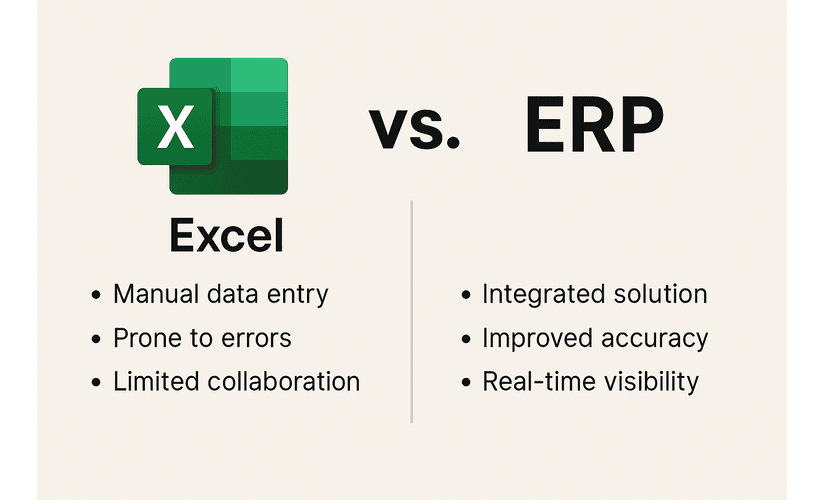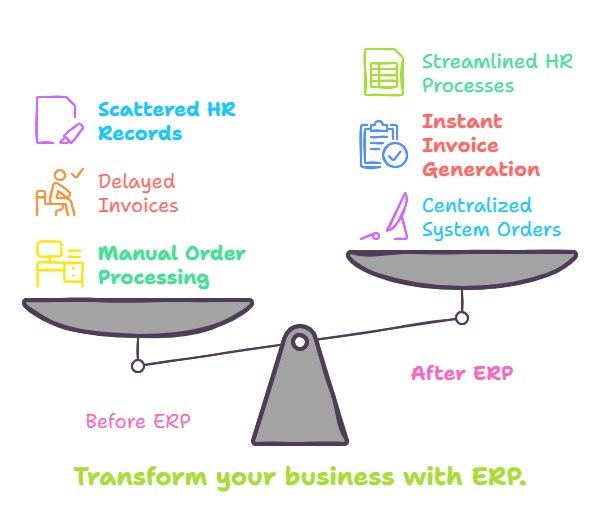KSOFT
In today's fast-moving business world, holding on to spreadsheets like Excel may seem convenient—but it might be doing more harm than good. If you’re still relying on Excel, WhatsApp messages, or manual processes to run your operations, it’s time to rethink how you manage your business.
As a software development company in the USA, we’ve helped businesses transition from scattered tools to integrated systems that boost productivity and minimize errors. Whether you're searching for the best software developers in the USA, looking for custom software development services, or want to collaborate with a professional website design company, it’s important to understand that the first step is letting go of outdated methods.
This blog is here to show how continuing with manual systems like Excel might be the reason your business isn’t scaling. And more importantly, how smarter alternatives—like ERP systems and custom-built solutions—can give you clarity, control, and real-time visibility across your operations.

Running a business using Excel and manual tracking may seem manageable, especially in the early stages. But as your operations grow, so do the problems. Here are three major areas where manual methods can do real damage.
Managing inventory on spreadsheets is a recipe for mistakes. You may find yourself:
When inventory management is broken, it leads to customer dissatisfaction, revenue loss, and increased operational costs.
Handling finances manually or via Excel often leads to delays and errors.
This disconnected approach to finances leads to misinformed planning, poor cash flow visibility, and delayed growth.
Many businesses run HR operations casually, thinking it's enough to manage them informally. But as you scale, it quickly becomes chaotic.
The lack of structure creates confusion, miscommunication, and errors that cost both time and money.
These challenges aren’t rare—they're widespread. And businesses often don’t recognize how serious they are until something breaks.
Manual management might feel okay now. But over time, the cost of not streamlining your operations builds up. Let’s look at the long-term consequences.
Repetitive tasks like updating sheets, reconciling orders, chasing invoices, and manually generating reports eat up hours every day. This is time that could be spent on strategy, growth, or customer experience.
Without access to real-time data, you’re making decisions in the dark. This results in missed deals, delayed launches, and poor business planning.
Employees spend significant time on repetitive tasks that could be automated. This leads to exhaustion and high turnover, especially when they’re expected to do the work of multiple people.
When systems don’t talk to each other, it’s easy to make mistakes—wrong delivery addresses, billing errors, missed timelines. And unhappy customers rarely return.
Without automation in follow-ups and payment reminders, businesses often forget to collect what they're owed. This leads to cash flow issues, payment delays, and increased financial stress.
Here’s a real story.
One of our clients lost a ten lakh client simply because an invoice was sent twice. It wasn’t intentional—just a copy-paste mistake in Excel. But the impact was huge. The client lost trust, and the business lost a major account.
These types of errors are common when relying on tools that aren’t built for managing complexity. And often, the losses are too great to ignore.
ERP stands for Enterprise Resource Planning. In simple terms, it’s a system that connects all your business functions—inventory, sales, HR, accounting, and operations—into a single platform.
Think of it as the central nervous system of your business. Everything communicates. Everything is tracked. Everything is visible.
Here's what an ERP system can do:
And when it’s a custom ERP, it’s built around your unique business process. No more adjusting your operations to fit someone else's software.
Switching from manual methods and Excel to an ERP system isn’t just a tech upgrade—it’s a complete shift in how your business functions. Here's a breakdown of the key differences across four major areas:
Before ERP:
Orders are written in notebooks or communicated through WhatsApp. Inventory is managed manually, leading to frequent stock mismatches, delays, and overstocking or understocking issues. There's no clear visibility into what’s available or what's needed.
After ERP:
Orders are processed through a centralized system with real-time status tracking. Inventory updates automatically after every sale or purchase, with alerts for low stock and expiration. Stock levels are accurate, reducing waste and ensuring availability.
Before ERP:
Invoices are created manually in Excel, often delayed or sent with errors. Payment tracking requires coordination with accountants, and cash flow insights are not easily available. Duplicate billing and missed payments are common.
After ERP:
Invoices are generated instantly with accurate details and linked to automated payment follow-ups. Real-time financial dashboards offer visibility into income, expenses, and profit/loss. Cash flow is monitored efficiently, minimizing payment delays.
Before ERP:
Leave requests, payroll, and attendance are handled through messages, emails, or manual sheets. Payroll calculations are prone to formula errors, and HR records are scattered and unorganized.
After ERP:
Employee attendance, leave, and payroll are all managed digitally. The system maintains accurate records, calculates salaries, and ensures timely disbursement. HR processes are streamlined and centralized.
Before ERP:
Important business data is stored across multiple spreadsheets, folders, and emails. Reports take hours to prepare, and decision-making is often delayed due to outdated or missing data.
After ERP:
All business data is accessible in one place with real-time reporting. Decision-makers can view KPIs, performance, and financials on their dashboards anytime. Strategic planning becomes faster, data-driven, and more accurate.
Want to see how it works in action? Watch our video on this topic :Excel is Hurting Your Business

Understanding the problems is only half the battle—choosing the right technology partner is what turns insight into action. At KSoft Technologies, we specialize in helping businesses like yours make that shift from outdated, manual tools like Excel to smart, scalable, and fully customized digital solutions.
Whether you need a powerful ERP system, a dynamic mobile application, or a fully optimized website, our expertise spans across key areas of digital transformation.
Here’s what we offer:
From SEO-focused SSR websites that improve your search engine visibility to lightning-fast CSR-powered platforms for interactive user experiences—we build for performance and growth.
Need interactive, high-performance Android or iOS apps? Our CSR-powered mobile apps are designed to drive user engagement and deliver seamless performance.
We design robust ERP systems tailored to your business processes—built with SSR for speed, security, and operational reliability.
Get round-the-clock support with performance optimization for any rendering method—ensuring your digital tools stay updated and efficient.
Our automation services streamline everyday operations and integrate seamlessly with your existing systems—cutting costs and boosting efficiency.
At KSoft Technologies, we understand that every business is different. That’s why we never use cookie-cutter solutions. Every app, website, or ERP we build is fully customized to align with your goals and your workflow. And with the latest WordPress version and cutting-edge development frameworks at our disposal, we’re ready to help you future-proof your digital presence.
As one of the top custom CRM development companies and providers of Flutter app development services in the USA, we understand the challenges businesses face in managing inventory, finance, HR, and customer data manually. From web design services in the USA to custom app solutions, our goal is to help businesses like yours move away from inefficient systems and toward streamlined, custom-built platforms.
Whether you need Android app development, mobile app developers in the USA, or you're simply searching for app developers near me in Kerala or the USA, we’ve got the expertise and experience to support your journey.
ERP systems and custom apps are not about replacing people—they’re about empowering your team and building a better business. If you're ready to grow smarter, not harder, connect with our team today.
